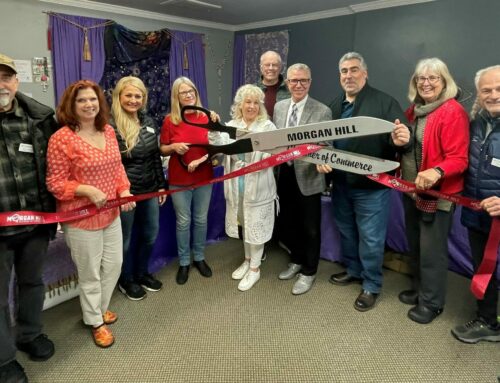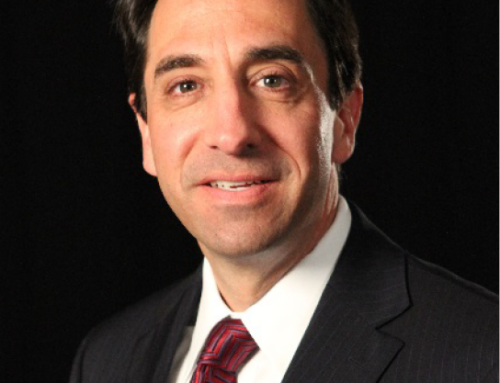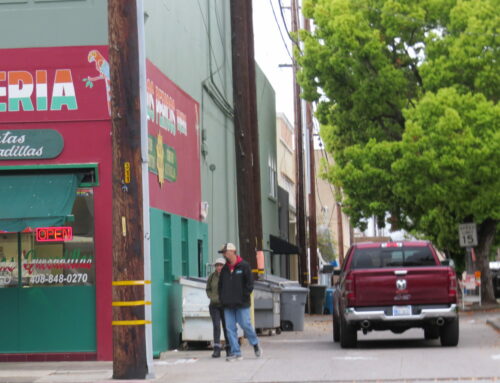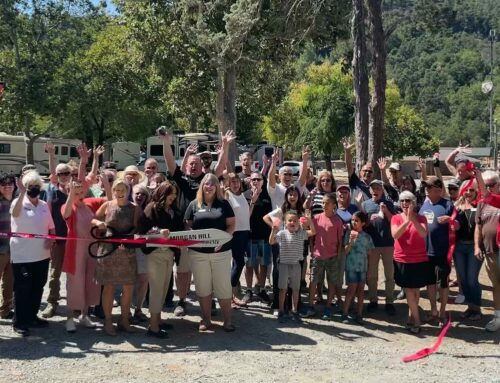Chiala, who died Jan. 2, developed tech innovations for local agriculture industry
Published in the January 18 – January 31, 2017 issue of Morgan Hill Life
By Marty Cheek

Photo courtesy Chiala family George Chiala enjoys time with his grandchildren Noa and Amelie Zands.
He was a farmer. That’s how he saw himself. But there was so much more to the man.
Surrounded by family and friends, George Chiala died Jan. 2 at Saint Louise Regional Hospital, the Gilroy medical facility he had devoted much of his time and energy to build to benefit the people of South Valley. He had bravely fought cancer for years, always exuding a cheerful and “gentle giant” personality to show the world he was bigger than the disease. He was 74.
Born in San Francisco in May 1942, Chiala was raised in Cupertino. At 16, he and his family moved to the Eastman Kodak Estate’s Fountain Oaks Ranch in the west hills of Morgan Hill. He attended Saint Francis High School and graduated from the University of Santa Clara with a bachelor’s of science degree in business.
Through his business, George Chiala Farms, he proved to be an innovator in ag engineering. In 1984 with the help of his wife, Alice Chiala, he built his company’s first vegetable processing plant. He also served as a soft-spoken but persevering leader for the communities of Morgan Hill, San Martin and Gilroy. He was progressive in his work as a steward of the environment in implementing his ideas for revolutionary clean and energy efficient technology that enabled his farming operations to save money and fuel.
Outside his business endeavors, Chiala worked diligently as a philanthropist spearheading development of his biggest goal in education for South Valley children, the proposed St. John XXIII College Preparatory High School. The Chialas’ four children went to St. Catherine’s School where he served on the school board for 15 years.
Chiala also worked on local health care through his longtime support of Saint Louise Regional Hospital, serving on the board and as the chair of the Saint Louise Hospital Foundation. He worked for the benefit of numerous other charities within the South Valley community he loved. He played a role in promoting youth sports with the creation of the soccer fields on Condit Road that evolved into the Morgan Hill Outdoor Sports Center. He also devoted much of his time to regional farming groups including the Santa Clara County Farm Bureau, the Task Force for Development of South County, and land-use committees.

Photo courtesy Lori McIntosh George and Alice Chiala when he won the LEAD honor from Leadership Morgan Hill.
Honoring Chiala’s decades of devotion to the hospital, youth sports and the farming community, the Morgan Hill Chamber of Commerce named him its 2005 Man of the Year. Leadership Morgan Hill chose him as its 2014 Leadership Excellence Award recipient. Chiala is survived by his wife Alice, their four children George Jr., Tim, Nicole and Christi, eight grandchildren, siblings Rosemarie, John, Bill and Fran, as well as nieces, nephews and their children. George’s brother Rick died last year.
“He was very passionate about Morgan Hill,” Alice said. “He loved the community and he was always willing to step up to whatever was going on in the community. He was very much involved when they started the campaign to build the hospital here. But when (friend and winemaker) George Guglielmo approached him and said, ‘We’re looking for support in the community, would you like to be involved?’ He said, ‘I would be happy to be involved.’ Any time there was an opportunity to be involved, he always said yes.”
Chiala had a huge heart for helping residents of the South Valley, including the employees of his businesses who received health care and 401(k) investment benefits to improve their quality of life, said his daughter Christi.
“He touched so many people, and he was on so many boards. But it was a place not from privilege but from a place of hardship where he knew how other people felt,” she said. “He could relate to struggling because he struggled and my mom struggled (building the farm business). So he tried to make life a little better for others because he felt it was the right thing to do through his faith.”

Anaerobe Systems CEO Mike Cox congratulates George Chiala after it was announced that Chiala was the recipient of the 2014 Leadership Excellence Award.
Photo by Marty Cheek
Following his death, local people told Christi stories about how Chiala helped them with their businesses and money hardships, circumstances he and Alice kept private, she said.
Chiala was also passionate about making sure local children had a good education, she said.
“My dad was very proud that he went to Santa Clara University and he worked extremely hard because things didn’t come naturally to him,” she said. “He did very well there, and he felt if it wasn’t for that strong Catholic education and the (Catholic) brothers who worked with him, that he wouldn’t have been able to start his business, provide for his family, provide for all of his employees.”
For years, he worked on the Saint John XXIII College Preparatory High School project, which is planned for construction on 38 acres owned by the Diocese of San Jose on the corner of Tennant and Murphy avenues in what is known as the Southeast Quadrant. The Santa Clara Local Agency Formation Commission in June 2016 rejected requests to annex the farm land into city limits, putting up a barrier to Chiala’s dream. The organizers continue to persevere with the project.
“He was so passionate about that school to help other people receive opportunities that he received,” Christi said.

Chiala taking a photo opportunity moment at a wedding with his granddaughters, Brianna and Chiara Becerra. Photo courtesy of Chiala family
Chiala was not only a humanitarian, he was also a smart businessman, she said. He ran his companies efficiently as his way of helping people because he knew he needed to generate profit and run a successful company, and then he would be able to give back. Much of the George Chiala Farms success came from the innovations in agricultural technology and business strategies. Necessity often prompted Chiala to come up with ingenious ways to process food, including a method to make dissolvable garlic for commercial use and re-processing onion and garlic dust into roasted powder to serve as an ingredient in packaged roasted gravy mixes and salad dressings. The farm grew over the decades and now produces bell peppers, garlic and mushrooms locally.
With an eye toward the future of cleaner energy sources, Chiala partnered with Morgan Hill businessman Mike Cox, owner of Anaerobe Systems, on an advanced system using microbes to turn agricultural and food waste into hydrogen and the carbon into fertilizer.
“We had so much waste because we were slicing and dicing and there was a lot of byproduct,” Alice said. “Most of it went to cattle feed. And Mike heard about our waste and he said, ‘I think I can use that to generate hydrogen.’ So George was very excited about that and that’s when he became so interested and started working with Mike.”
Fran described her brother as a man who loved children, a “boy at heart” who enjoyed having mischievous fun with his children and grandchildren. On holidays, he would help them make “traps” to capture Santa Claus and the Easter Bunny. When she worked as a principal at a Cupertino elementary school decades ago, Chiala would play the role of St. Nick to entertain the children during the holidays. One year, he arrived in a helicopter.
“All the kids — 680 of them — were sitting on their little chairs outside waiting for Santa. They didn’t know where he was going to come from. They thought he would come with the reindeer,” Fran said. “So the helicopter circles a couple of times and then they land in the middle of the field — it was just beautiful. George gets out of the helicopter, and he’s suffering from motion sickness. His face was green.”
Chiala’s son Tim recalls advice his father gave him as a teenager figuring out what to do as a career.
“I didn’t want to be a farmer — that was the last thing I wanted to do,” Tim said. “I wanted nothing to do with this place when I was growing up. But he said, ‘No matter what you do, fine, don’t be a farmer. But you’ve got to remember that everyone needs to eat. And there’s no more honorable career than feeding people, keeping people alive.’”
Today, Tim and George, Jr., operate the family’s South Valley business, the second generation continuing to feed people.
George Chiala was a farmer. But he was also a man who devoted his life to making things better for everyone in the South Valley. He will be long loved and well remembered by many of his friends and family.






